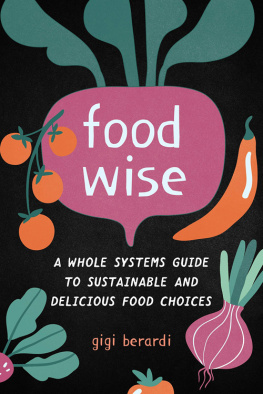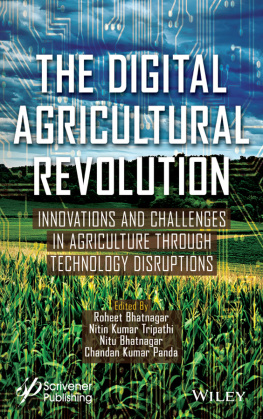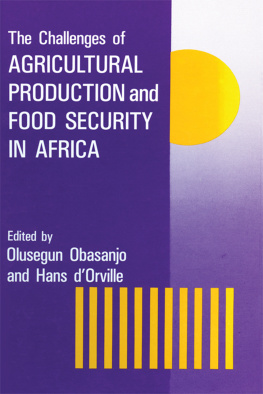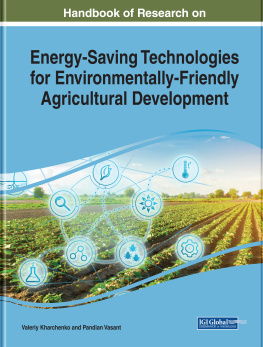
The Social Consequences and Challenges of New Agricultural Technologies
Other Titles in This Series
The Impact of Population Change on Business Activity in Rural America, Kenneth M. Johnson
Rural Public Services: International Comparisons, edited by Richard E. Lonsdale and Gyrgy Enyedi
*Science, Agriculture, and the Politics of Research, Lawrence Busch and William B. Lacy
*Rural Society in the U.S.: Issues for the 1980s, edited by Don a. Diliman and Daryl J. Hobbs
Technology and Social Change in Rural Areas: A Festschrift for Eugene A. Wilkening, edited by Gene F. Summers
*Available in hardcover and paperback.
Rural Studies Series
The Social Consequences and Challenges of New Agricultural Technologies
edited by Gigi M. Berardi and Charles C. Geisler
Although formal social impact assessment of changing technologies in U.S. agriculture is still in its infancy, scholars have been documenting the effects of new technology throughout the twentieth century. In this collection, Prcfessors Berardi and Geisler bring together historically relevant research and a carefully chosen cross section of contemporary work. Their review of the literature is followed by an evaluation of the effects of mechanization on labor and production, written in 1904, which provides a backdrop for papers from the 1940s and 1950s examining the mechanization of agriculture in the South, in the Midwest, and in rural areas in general. Subsequent chapters offer present-day insights on such topics as the socioeconomic consequences of automated vegetable and tobacco harvesting, center-pivot irrigation, and organic and no-till cultivation. The authors also look at compensation and adjustment programs for displaced labor, the relationship between technology and agribusiness growth, and the effectiveness of university programs that prepare students to perform social impact assessments in agriculture. The edited proceedings of a spirited roundtable discussion on new directions for the study of the social impacts of farm technology and the political economy of agriculture provide the thought-provoking conclusion to this overview of the field.
Gigi M. Berardi is assistant professor of environmental science at Allegheny College in Meadville, Pennsylvania. She is a contributor to several volumes, including Food and Energy Resources (Hall and Pimental, eds.; 1983) and The Tobacco Industry in Transition: Policies for the Eighties (Finger, ed.; 1981). Charles C. Geisler is assistant professor of rural sociology at Cornell University and a research associate with COACT Research, Inc., in Madison, Wisconsin. He is coeditor of and contributor to Land Reform,American Style (Popper; 1984), Labor and the Environment: An Analysisof and Annotated Bibliography on Workplace and Environment Qualityin the U,S. (Buttel and Wiswall; 1984), and Indian SIA: The Social Impact Assessment of Rapid Resource Development (Green, Usner, and West? 1982).
THE RURAL STUDIES SERIES of the Rural Sociological Socieiy
Editorial Board
Chairman, David L. Brown, ERS, USDA, Washington, D.C.
Jere L. Gilles, University of Missouri
Denton E. Morrison, Michigan State University
Sonya Salamon, University of Illinois
Marta Tienda, University of Wisconsin
Kenneth P. Wilkinson, Pennsylvania State University
James J. Zuiches, Cornell University
First published 1984 by Westview Press
Published 2019 by Routledge
52 Vanderbilt Avenue, New York, NY 10017
2 Park Square, Milton Park, Abingdon, Oxon OX14 4RN
Routledge is an imprint of the Taylor & Francis Group, an informa business
Copyright 1984 Taylor & Francis
All rights reserved. No part of this book may be reprinted or reproduced or utilised in any form or by any electronic, mechanical, or other means, now known or hereafter invented, including photocopying and recording, or in any information storage or retrieval system, without permission in writing from the publishers.
Notice:
Product or corporate names may be trademarks or registered trademarks, and are used only for identification and explanation without intent to infringe
Library of Congress Catalog Card Number: 84-50648
ISBN 13: 978-0-367-29579-0 (hbk)
Contents
Gigi M. Berardi and Charles C. Geisler
Gigi M. Berardi
H. W. Quaintance
United States Department of Agriculture
C. Horace Hamilton
B. O. Williams
Robert T. McMillan
Alvin L. Bertrand
Andrew Schmitz and David Seckler
Ahmed M. Hussen
O. E. Thompson and Ann F. Scheuring
Leon B. Perkinson and Dale M. Hoover
Gigi M. Berardi
William H. Friedland
Charles C. Geisler, J. Tadlock Cowan, Michael R. Hattery, and Harvey M. Jacobs
Council for Agricultural Science and Technology: James Copp, Task Force Chairman
Anne Fredricks
Howard Newby and Peter Utting
Jack Kloppenburg, Jr.
We are indebted to Gigi Berardi and Charles Geisler for bringing together in one volume a substantial part of the major work by social scientists on the social and economic impacts of new agricultural technologies. The compilation provides perspective on the scope and nature of the accumulated research into commodities, commodity systems, and agricultural regions given the most attention by investigators. It serves as an introduction to the methods which have been used in assessing the impacts of new technologies in farm production. And it offers access to classic pioneering studies, to contemporary work not generally known or widely available, and to new material prepared specifically for this volume.
The selections pertain to studies of the consequences of new farming technologies in the United States, with the exception of the papers by Newby and Utting on agribusiness in the United Kingdom and by Kloppenburg on biotechnology. The editors caution that even for the United States the selections are not all-inclusive of the research-based literature available since publication of the historically important but little-known work in 1904 by H. W. Quaintance, The Influence of Farm Machinery on Production and Labor .
Agricultural technology with significant economic and social consequences was being adopted by American farmers long before the advent of the rural social sciences. McCormicks grain reaper (1831), Deeres steel share plow (1837), the horse-drawn sulky and gangplow, barbed wire fencing, and the windmill are a few examples of such innovations. By the time the rural social sciences had gained a place in the nations land-grant colleges, in the United States Department of Agriculture, and elsewhere, the continuing stream of new technologies had become an important factor in the drastic adjustments in American agriculture associated with the reduction in farm workers. Reorganization in the structure of agriculture had already had adverse impacts on many farming-based communities and on the living patterns of farm families.
Technology has continued to outstrip social scientists ability to assess its impacts. A review of the relatively limited amount of empirical investigations to date into the impacts of technology in agriculture suggests that the research has been highly selective as to the types of technology and the agricultural regions studied. Mechanization in the South, especially in cotton production and in flue-cured tobacco harvesting, and mechanization of vegetable harvesting in Californias irrigated farming areas have been well studied, but their conspicuousness points to the selectivity of the research. Why have the social impactspositive and negativeof so many other important technological developments received so little research attention? Possible reasons include the relatively low concentration of labor in the production of commodities other than tomatoes and tobacco and institutional and funding constraints on research at various land-grant colleges.












